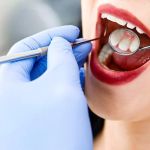The Connection Between Mouth Bacteria and Gum Disease
- Understanding the Role of Mouth Bacteria
- How Mouth Bacteria Lead to Gum Disease
- Prevention and Treatment of Gum Disease
- Real-Life Cases of Gum Disease and Bacteria
- Why It’s Essential to Take Care of Your Oral Health
Our mouths are home to millions of bacteria. While many of these microorganisms are harmless, some can lead to significant oral health issues, including gum disease. Gum disease, also known as periodontal disease, is caused by the accumulation of plaque, a sticky film of bacteria that forms on the teeth and gums. The bacteria in the plaque produce toxins that can irritate and damage the gums, leading to inflammation, bleeding, and even tooth loss if not addressed.
The connection between mouth bacteria and gum disease is both straightforward and concerning. As bacteria accumulate on the teeth and gums, they form plaque, which hardens into tartar over time. This tartar then serves as a breeding ground for even more bacteria. The bacteria release toxins that irritate the gums, leading to conditions like gingivitis (early gum disease) and, if left untreated, more severe forms of periodontitis.
Without proper oral hygiene, the bacteria in the plaque multiply and cause the gums to become inflamed and infected. This can result in symptoms such as swollen, red gums, bad breath, and, in advanced cases, receding gums and bone loss. It is crucial to recognize the signs of gum disease early on to avoid long-term damage.
Preventing gum disease begins with maintaining good oral hygiene. Brushing your teeth at least twice a day and flossing daily are essential habits to reduce the buildup of plaque and bacteria. Additionally, regular dental checkups are crucial for catching potential problems early before they develop into serious gum disease.
When it comes to treatment, if gum disease is caught in its early stages, it may be manageable with professional cleanings and better home care. However, more advanced cases may require treatments such as scaling and root planing (deep cleaning) or even surgery in severe cases. Your dentist will guide you on the most appropriate treatment depending on the severity of the disease.
There have been numerous cases of people who struggled with gum disease due to poor oral hygiene, often exacerbated by smoking, poor diet, or underlying health conditions such as diabetes. For example, a middle-aged woman named Sarah had noticed her gums bleeding when she brushed her teeth. She ignored the signs for months, assuming they would go away on their own. Eventually, she sought professional help and was diagnosed with periodontitis, requiring multiple visits for deep cleaning and follow-up treatments to save her gums.
Another case involved John, who had a history of gum disease in his family. He regularly visited his dentist, who advised him on the importance of proper brushing and flossing techniques. Through consistent care, John was able to keep his gum disease at bay, demonstrating the power of preventative measures.
Understanding the connection between mouth bacteria and gum disease is key to preventing oral health issues. Regular brushing, flossing, and dental visits are your best defense against gum disease, as they help keep harmful bacteria in check. Remember, taking care of your teeth today can save you from painful and expensive procedures down the road.
If you're concerned about your oral health or experiencing symptoms of gum disease, don't wait to seek professional advice. Take action today and make oral hygiene a priority. Interested in learning more about how to protect your gums? Click here to explore our recommended dental care products.







 Rhode Island Children's Dentistry & Orthodontics4.0 (806 review)
Rhode Island Children's Dentistry & Orthodontics4.0 (806 review) Maple Brook Dental of MN4.0 (532 review)
Maple Brook Dental of MN4.0 (532 review) Dr. Valarie Kreps0.0 (0 review)
Dr. Valarie Kreps0.0 (0 review) Oral Surgery Hawaii4.0 (385 review)
Oral Surgery Hawaii4.0 (385 review) Gilbert Vista Dental4.0 (55 review)
Gilbert Vista Dental4.0 (55 review) Gentle Dental Riverside Tyler Village4.0 (122 review)
Gentle Dental Riverside Tyler Village4.0 (122 review) The Importance of Oral Health Education During Pregnancy for a Healthy Pregnancy
The Importance of Oral Health Education During Pregnancy for a Healthy Pregnancy Best Tips for Brushing Your Teeth Properly for Healthy Gums: Essential Techniques for Oral Health
Best Tips for Brushing Your Teeth Properly for Healthy Gums: Essential Techniques for Oral Health Why Skipping Dental Checkups Can Lead to Bigger Oral Health Problems
Why Skipping Dental Checkups Can Lead to Bigger Oral Health Problems Advantages of Porcelain Dental Restorations
Advantages of Porcelain Dental Restorations How Can Diabetes Cause Tooth and Gum Problems? Preventing and Managing Oral Health Issues
How Can Diabetes Cause Tooth and Gum Problems? Preventing and Managing Oral Health Issues Healthy Habits for Promoting Good Oral Health and Hygiene: Tips for a Healthy Smile
Healthy Habits for Promoting Good Oral Health and Hygiene: Tips for a Healthy Smile